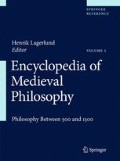Abstract
John of Paris (d. in 1306) was a Dominican theologian, deeply and personally involved in the theological and political debates of his time. He is well known as the most outstanding “ideological” supporter of Philip the Fair in his struggle against Boniface VIII. His treatise De regia potestate et papali played an important role in medieval political thought, also after the dramatic conclusion of the clash between papacy and the French crown. John counters, in fact, curial claims of plenitude of power in a way that found positive echo also in the Conciliar epoch. His philosophical and theological doctrines have been studied only partially. He was a convinced advocate of the unity of substantial form, against the doctrine of the plurality of forms, held by most Franciscan authors of the time. He also rejected William de la Mare’s criticism of Aquinas; this does not imply, however, that he always reproduces the thought of his great confrere. His most controversial theological opinion was his account of the Eucharistic miracle as “impanation” and not as “transubstantiation.” Although in a moderate way, he also criticized the Catalan physician and theologian Arnau de Villanova for his attempts at determining the exact time of coming of the Antichrist.
Bibliography
Primary Sources
(1516) De adventu antichristi. In: de Cusentia Telesphorus, De magnis tribulationibus in proximo futuris. Venetiis, pp 44–51v
(1941) Correctorium corruptorii ‘circa'. In: Le Correctorium corruptorii “circa” de Jean Quidort, ed. Müller JP. Romae
(1961–1964) Super libros sententiarum (reportatio), I, II, ed. Müller JP. Roma
(1969) De potestate regia et papali, ed. Bleienstein F. Stuttgart (although on a narrow manuscript basis, already edited in Leclercq J (1942) Jean de Paris et l'écclesiologie de XIIIe siècle. Paris, pp 173–260; English trans: Watt JA (1971) John of Paris, On royal and papal power. Toronto)
(1974) De principio individuationis. In: Müller JP, Eine Quästion über das Individuationsprinzip des Johannes von Paris O. P. (Quidort). In: Möller J, Kohlenberger H (eds) Virtus politica, Festgabe zum 75. Geburtstag für Alfons Hufnagel. Stuttgart-Bad Cannstatt, pp 335–356
(1977) Determinatio de modo existendi corporis Christi in sacramento altaris. In: Pattin A, Jean de Paris et son traité sur l'impanation. Angelicum 54:184–189, 190–206
Heiman AJ (1955) Quodlibet. The first quodlibet of Jean Quidort. In: J'Donnel JR (ed) Nine medieval thinkers. A collection of hitherto unedited texts. Toronto, pp 271–291
Hödl L (ed) (1962) De confessionibus audiendis. Mitteilungen des Grabmann-Instituts, München
Secondary Sources
Coleman J (1984) ‘Ratio’ and ‘dominium’ according to John of Paris and Marsilius of Padua. In: Kaluza Z, Vignaux P (eds) Preuves et raisons à l’Université de Paris. Paris, pp 65–81
Coleman J (1992) The intellectual milieu of John of Paris O. P. In: Miethke J (ed) Das Publikum politischer Theorie in XIV Jahrhundert. Oldenbourg Verlag, München, pp 173–206
Conetti M (2000) In margine alla quaestio in utramque partem. Studi Medievali 41:339–368
Dunbabin J (2002) The commentary of John of Paris on the sentences. In: Evans GR (ed) Medieval commentaries on the sentences of Peter Lombard. Current Research, I. Brill, Leiden/Boston/Köln, pp 131–147
Gerwing M (1996) Vom Ende der Zeit: der Traktat des Arnald von Villanova über die Ankunft des Antichrist in der akademischen Auseinandersetzung zu Beginn des 14. Jahrhunderts. Aschendorff, Münster, pp 254–448
Heiman AJ (1953) Essence and “esse” according to Jean Quidort. Mediaev Stud (15):137–146
Miethke J (2000) De potestate papae. Die päpstliche Amtskompetenz im Widerstreit der politischen Theorie von Thomas von Aquin bis Wilhelm von Ockham. Mohr Siebeck, Tübingen, pp 116–126
Müller JP (1947) La these de Jean Quidort sur la beatitude formelle. In: Mélanges Auguste Pelzer. Etudes d’histoire littéraire et doctrinale de la Scolastique médiévale offertes a monsigneur Auguste Pelzer, Louvain, Bibliothéque de l’Université, pp 493–511
Oakley F (1981) Natural law, the “corpus mysticum” and conciliar thought from John of Paris to Matthias Hugonius. Speculum 56:786–810
Pickavé M (2007) The controversy over the principle of individuation in quodlibeta. In: Schabel Chr (ed) Theological quodlibeta in the middle ages. The fourteenth century. Leiden/Boston, pp 59–69
Senger P (1981) John of Paris, principal author of the quaestio de potestate papae (Rex pacificus). Speculum 56:41–55
Ubl K (2000) Engelbert von Admont. Ein gelehrter im Spannungsfeld von Aristotelismus und christlicher Überlieferung. Oldenbourg, Wien/München, pp 193–206
Ubl K (2003) Johannes Quidorts Weg zur Sozialphilosophie. Francia 30:43–72
Ubl K, Vinx L (2000) Kirche, Arbeit und Eigentum bei Johannes Quidort von Pas O. P. (†1306) In: Egger Chr, Weigl H (eds) Text-Schrift-Codex. Quellenkundliche Arbeiten aus dem Institut für Österreichische Geschichtsforschung. Wien/München, pp 304–344
Author information
Authors and Affiliations
Editor information
Editors and Affiliations
Rights and permissions
Copyright information
© 2011 Springer Science+Business Media B.V.
About this entry
Cite this entry
Lambertini, R. (2011). John of Paris. In: Lagerlund, H. (eds) Encyclopedia of Medieval Philosophy. Springer, Dordrecht. https://doi.org/10.1007/978-1-4020-9729-4_274
Download citation
DOI: https://doi.org/10.1007/978-1-4020-9729-4_274
Publisher Name: Springer, Dordrecht
Print ISBN: 978-1-4020-9728-7
Online ISBN: 978-1-4020-9729-4
eBook Packages: Humanities, Social Sciences and Law

